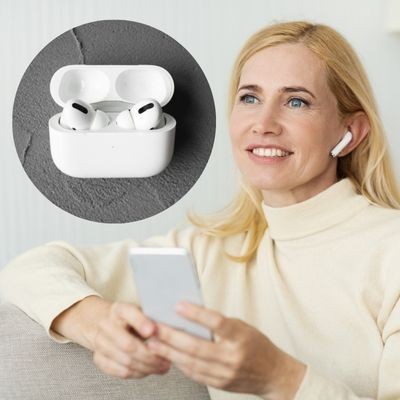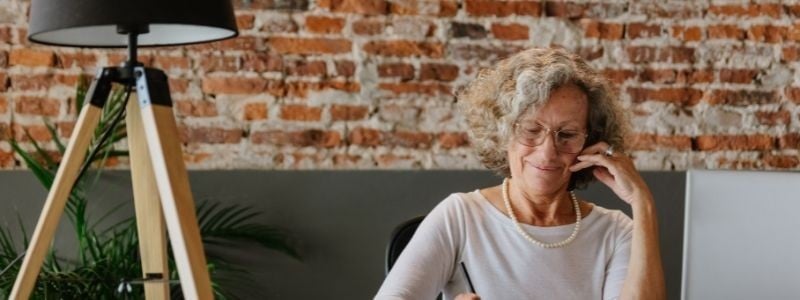
Head of Online Medical Content

Audiology Expert at Hearing Aid UK

Hearing Aids for Pensioners in the UK
Elderly and senior hearing aids and healthcare information
Introduction | Hearing loss and hearing aid facts | Advantages of hearing aids for seniors | Considerations for elderly hearing healthcare | Best hearing aids for pensioners UK | Conclusion
Hearing aids for seniors
Hearing loss is a common concern as we age, often impacting daily life and social interactions. Finding the right hearing aid is key, considering factors like lifestyle, battery life, ease of use, and affordability. These devices are vital for managing age-related hearing challenges, enhancing sound clarity, and improving overall listening experiences.
In this article, we discuss our real-life experiences and knowledge of consumer wants, needs, and requirements of the modern-day pensioner.
Age should never be a barrier to hearing
Current UK statistics show that 40% of people over the age of 50 have some degree of hearing loss. Age is the most common cause of hearing loss, due to the natural wear and tear of the tiny hair cells in the inner ear, but there are other causes too, like prolonged exposure to loud noises.
Hearing loss is usually a gradual process that people don't notice immediately, but you must seek professional help as soon as you do. This will ultimately improve the success of your treatment and future hearing healthcare.
Hearing aids are generally the preferred treatment for many types of hearing loss, as they make sounds louder and clearer. They amplify sound and can distinguish the difference between foreground noise, like conversation and background noise like traffic. Focusing on what you want to hear and reducing the sounds that aren't important to you.
Hearing aids make life that little bit easier
Hearing aids can also reduce the feedback you commonly get when wearing devices, so your hearing experience is more comfortable and natural. Hearing aids will not cure your hearing loss, but they are essential to improving your quality of life, staying connected to those around you, and making life that little bit easier.
Some hearing loss and hearing aid facts:
- 1 in 6 people in the UK has some form of hearing loss.
- Ageing is the most common cause of hearing loss; overall, hearing impairment increases naturally with age.
- Hearing loss can triple your risk of a fall.
- Hearing loss can contribute to sleeping disorders.
- Untreated hearing loss can lead to anxiety, depression, and mental health issues.
- 5-7 years is the average someone will wait until they get their hearing checked professionally.
- Hearing aids are proven to reduce the risk of developing dementia and Alzheimer's.
- Hearing aids can sync with electrical devices, so you can easily connect to your at-home devices, people, and the world.
- Hearing aids can connect to loop systems for use in public spaces and places of worship.
Hearing Aids for Pensioners, Seniors and the Elderly
The older generation is more tech-savvy than ever
Hearing aids for seniors
Hearing is one of our most fundamental senses, connecting us to the world and enabling communication with others. Hearing aids have come a long way in terms of technology and design.
What is important to realise is that people who are over 60 still want the connectivity, high technical specifications, and features of their hearing aids, just as much as those who are younger.
We cannot assume that pensioners of this generation are looking for hearing aids that existed twenty years ago. The majority have active lifestyles that need catering to, as well as their hearing loss, without limitations!
We are seeing a great increase and shift in consumers' wants and needs of this demographic, and with that, the demand for technology advancements has risen. The pensioners of today's world want great Bluetooth connectivity to all their favourite electrical devices, they want modern features and they want stylish and contemporary models.
Opting for styles that aren't just aimed at helping dexterity issues, but are something they need to wear and want to wear. Hearing devices that not only help them to hear better but also complement their lifestyle, however active, so they can thrive and live life to the full.
Cost of hearing aids for pensioners
Hearing aids can be expensive, and many seniors may not have adequate insurance coverage for them. It's essential to explore the devices available and ways that can help make hearing aids more affordable.
So, how much does a hearing aid cost for pensioners? The price of hearing aids for pensioners is the same as any other - to give you an idea of cost - our hearing aid prices start from £495 per aid. How much you a willing to spend depends entirely on your budget, lifestyle, connectivity needs, features, hearing loss level, and more.
Hearing aids discounts for seniors
You might be wondering if you can receive help with hearing aid costs for seniors. In some cases, you can look into a type of hearing aid pensioner concession card. For instance, we do offer a fixed discount for seniors who have a Defence Discount Service card - call us on the contact number below to find out more.
We also advise that you speak with your local audiologist to find out what's available in the UK hearing aid market. Your audiologist will also advise you on what hearing aid would suit you better, as you don't need to spend more on a hearing aid device if you don't need to. You only need to pay for what you need.
Your audiologist can also advise you on:
- The best hearing aids for pensioners and dexterity issues
- Bluetooth hearing aids for pensioners who want wireless connectivity
- Hearing aid batteries for pensioners and rechargeable options, so there is no fiddly battery change process
- Hearing aids that require little maintenance and upkeep
New Hearing Aids for Pensioners
Hearing aids are gateways to an improved quality of life
Hearing aids for seniors aren't the same as they used to be; they are much better!
The modern hearing aids on the market today offer pensioners the opportunity to challenge the boundaries of hearing loss in every hearing situation with incredible ease. The marvel that is the current hearing aid technology now gives us discreet hearing aid options, all-day comfort, natural sound, and automatic adjustments.
With more options to choose from and continued development in remote healthcare, hearing aids are easier to control, readily accessible, and compatible with mobile phones. You can start enjoying life again as you concentrate on hearing, rather than thinking about your hearing aids.
Getting all the advantages of digital hearing aids discreetly and with a solution that works in all areas of your life, not just your hearing loss.
What are the best hearing aids for pensioners UK?
So, what are the best hearing aids for pensioners? When choosing a hearing aid, there are so many factors to consider, but thankfully, the choice is forever increasing, and we no longer have to settle for that 'brown banana' of a bygone time.
For pensioners, there might be more criteria to tick - please remember we a generalising here - but here are some examples before we talk about our two most popular hearing aids for seniors further down the page.
- When dexterity is a problem: A small hearing aid means small batteries, and sometimes these can be quite difficult to change. So, if dexterity is a problem, then these hearing aids might not be right for you.
- When you need extra power: Previousl,y if you fell into this category then there was very little on the market that could help you, however with recent advances in miniaturisation and power amplification there is now a select range of superpower hearing aids that could make a real difference to your day to day life.
Bigger power doesn't necessarily mean bigger hearing aids - there are a lot of superpower devices that are small in size.
- When you want a discreet shape but are not sure if it's suitable: Modern hearing aids can actually be completely invisible, but even if you choose a non-invisible model, the designs are now sleek and inconspicuous, whatever your age.
However, these types of hearing aids aren't compatible with everyone. This is something you can discuss with your audiologist.
- When connectivity is important to you: What is impressive is the use of Bluetooth within hearing aid technology, which has continued to advance over the past few years, offering consumers flexibility, great connectivity, and pairing hearing aids with mobile phones.
So, listening to your favourite radio station is even more enjoyable.
- When you want features/apps that benefit your hearing health: There are now plenty of beneficial hearing aid apps from all the manufacturers that can and do enhance your life. For instance, Starkey created the first 'healthable' hearing aid range with the Livio range.
So, you can access fall detection, health diagnostics, and much more at the touch of your fingertips. Great for you to keep track of your personal hearing health and extra reassurance for your family members.
- Type of hearing loss: Seniors may have different types of hearing loss, including conductive, sensorineural, or mixed. It is important to identify the type of hearing loss to determine the most appropriate hearing aid.
- Lifestyle and preferences: Seniors have different lifestyles and preferences, so it is important to choose hearing aids that fit their needs. For example, if they are active, they may need hearing aids that are water-resistant or have a longer battery life.
- Comfort and ease of use: Hearing aids should be comfortable to wear and easy to use. Seniors may prefer hearing aids that are simple to operate.
NHS hearing aids for pensioners - Are hearing aids free for pensioners?
Some consumers are wondering, "How much do hearing aids cost for pensioners?" and "Are there free hearing aids for pensioners?". This ultimately all depends on whether you want to opt for NHS or private hearing healthcare - it's a personal choice.
While we understand and respect the hearing service that the NHS provides, if advanced technology, connectivity, choice, and modern styles are important to you, the NHS has limitations in these areas. For instance, NHS hearing aids are unable to offer Bluetooth connectivity at this time.
Best Hearing Aids for Seniors and the Elderly
Challenges and advantages of hearing aids for the elderly
Advantages of hearing aids for seniors
- Improved communication: Hearing aids amplify sounds, making it easier for seniors to hear and understand conversations, both in quiet settings and noisy environments.
- Enhanced quality of life: Hearing aids can help seniors stay engaged in social activities, enjoy music and television, and participate in conversations, leading to a more fulfilling life.
- Increased safety: Hearing aids enable seniors to hear important warning signals, alarms, and alerts, reducing the risk of accidents and improving overall safety.
- Cognitive benefits: Addressing hearing loss with hearing aids may contribute to better cognitive function and potentially slow down cognitive decline.
- Emotional well-being: By reducing feelings of isolation and frustration associated with hearing loss, hearing aids can positively impact seniors' emotional health.
Challenges and considerations for elderly hearing healthcare
- Adjustment period: Adapting to hearing aids can take time. Seniors may need patience and support as they get used to the new sounds and sensations.
- Maintenance: Hearing aids require regular cleaning and maintenance to ensure they function correctly. Seniors should be prepared for this ongoing responsibility.
- Consultation: Choosing the right hearing aid involves consultation with an audiologist or hearing specialist who can assess the specific needs and preferences of the individual. This personalised approach is essential for optimal results.
- Battery life: Seniors should be aware of the battery life of their hearing aids and carry spare batteries if needed, particularly when traveling or in situations where replacements may not be readily available.
- Connectivity: Modern hearing aids often come with Bluetooth connectivity, allowing for seamless integration with smartphones and other devices. Seniors should consider whether this feature is beneficial for their lifestyle.
Age-related hearing loss is the most common cause of hearing loss
Some seniors usually develop hearing loss so slowly that they might not even recognise how vital professional help is. There might be others who think that they will be judged and treated differently if they were to wear a hearing aid.
In my experience, the biggest roadblocks in finding help are a lack of knowledge about the hearing aid market and cost. But it doesn't have to be. I believe that seniors can feel more confident in their decision-making if they know more about the products available on the market and the audiology industry itself.

Hearing Aids for Seniors and the Elderly
Why are hearing aids important for the elderly?
The importance of hearing aids for seniors
As we have mentioned, as we age, hearing loss becomes a common challenge that can greatly affect the overall quality of life. Highlighting the value of hearing aids is essential, especially with today’s technological advancements designed to meet the changing needs of older adults.
Modern hearing aids do more than just amplify sound – they offer innovative features like wireless connectivity and advanced noise cancellation, making them a seamless fit for modern lifestyles.
The benefits go beyond better hearing. Hearing aids improve communication, boost social interaction, and enhance overall well-being. By embracing this technology, seniors can continue enjoying their favourite activities and maintain a fulfilling, connected life.
Best hearing aids for seniors conclusion
Choosing the right hearing aid is an important step for seniors who want to enhance their hearing and regain clarity in daily life. The ideal hearing aid should balance essential features, budget, and battery life.
Hearing loss is a common condition among seniors, and hearing aids can be an effective solution for improving their quality of life. Choosing the right hearing aids for seniors requires consideration of their individual needs, preferences, and lifestyle, and consultation with a hearing healthcare professional.
For seniors and their families, investing in hearing aids is an investment in a more vibrant and engaged life, one filled with the sounds of joy, conversation, and connection to the world.
Why Choose Us?
- FREE Hearing Tests
- Best Hearing Aids and Prices
- FREE Aftercare for Life
- FREE Home Visits
- 200+ Local Audiologists
- 60 Day Money Back Guarantee
Hearing Aids for Pensioners, Seniors and the Elderly
Hearing Aid UK can support you or a loved one
We understand and can completely relate to how overwhelming embarking on your hearing healthcare journey is. Whatever your age, type of hearing loss or level of hearing loss, Hearing Aid UK can support, advise and assist in locating your nearest audiologist who can guide you in the right direction.
Call us free on 0800 567 7621 to get your hearing and your life back on track.
Hearing aid advice articles you might like...
 Do Hearing Aids Work for Everyone?
Do Hearing Aids Work for Everyone?  Wearing Hearing Aids with Glasses
Wearing Hearing Aids with Glasses  Risks of Wearing Apple AirPod Pro 2's
Risks of Wearing Apple AirPod Pro 2's What's included in our hearing aid prices?
Our specialist service includes:
Do not spend hundreds of pounds without getting a second opinion from us.
Please call us on 0800 567 7621
 Not only are the prices great, but the service is fantastic! Many thanks to your team.
Not only are the prices great, but the service is fantastic! Many thanks to your team.Common FAQs about hearing aids and hearing loss
If you are looking at this page then it is likely that an audiologist has suggested that you purchase this particular hearing aid, so is this the best model for you?
In general, any audiologist will always recommend to you the model that best suits your needs. Here is a useful checklist to make sure that is the case.
- Audiologist level of knowledge: The audiologist you have seen will hopefully have a wide knowledge of all available hearing aids, however, some will only be familiar with a small number of brands and therefore may not really be in a position to know which model is the best for you. It is OK to challenge their recommendation and ask them to justify why this particular brand is the one for you.
- Do research: Read about the hearing aid that was recommended. Does it seem like it will suit your lifestyle? Does it have more or fewer features than you need?
- Be aware of sales targets: Many high street retailers have specific tie-ins to a particular manufacturer/brand. The hearing aid they have suggested may still be the correct one for you, but do your research so that you know why they might have recommended it.
If in doubt, feel free to give us a call. That's what we're here for. In the meantime, read all about our review of the best hearing aids for 2025 here
If you have significant hearing loss in both ears, you should be wearing two hearing aids. Here are the audiological reasons why:
Localisation: The brain decodes information from both ears and compares and contrasts them. By analysing the minuscule time delays as well as the difference in the loudness of each sound reaching the ears, the person is able to accurately locate a sound source. Simply put, if you have better hearing on one side than the other, you can't accurately tell what direction sounds are coming from.
Less amplification is required: A phenomenon known as “binaural summation” means that the hearing aids can be set at a lower and more natural volume setting than if you wore only one hearing aid.
Head shadow effect: High frequencies, the part of your hearing that gives clarity and meaning to speech sounds, cannot bend around your head. Only low frequencies can. Therefore if someone is talking on your unaided side you are likely to hear that they are speaking, but be unable to tell what they have said.
Noise reduction: The brain has its own built-in noise reduction which is only really effective when it is receiving information from both ears. If only one ear is aided, even with the best hearing aid in the world, it will be difficult for you to hear in background noise as your brain is trying to retain all of the sounds (including background noise) rather than filtering it out.
Sound quality: We are designed to hear in stereo. Only hearing from one side sounds a lot less natural to us.
Fancy some further reading on this topic? You can read about why two hearing aids are better than one in our article, hearing aids for both ears, here
For most people, the main benefit of a rechargeable hearing aid is simple convenience. We are used to plugging in our phones and other devices overnight for them to charge up. Here are some other pros and cons:
For anybody with poor dexterity or issues with their fingers, having a rechargeable aid makes a huge difference as normal hearing aid batteries are quite small and some people find them fiddly to change.
One downside is that if you forget to charge your hearing aid, then it is a problem that can't be instantly fixed. For most a 30-minute charge will get you at least two or three hours of hearing, but if you are the type of person who is likely to forget to plug them in regularly then you're probably better off with standard batteries.
Rechargeable aids are also a little bit bigger and are only available in Behind the Ear models.
Finally, just like with a mobile phone, the amount of charge you get on day one is not going to be the same as you get a few years down the line. Be sure to ask what the policy is with the manufacturer warranty when it comes to replacing the battery.
Looking for more information on rechargeable hearing aids? Read our dedicated page on the topic here
For most people, the answer is yes. But it's never that simple.
The majority of hearing problems affect the high frequencies a lot more than the low ones. Therefore open fitting hearing aids sound a lot more natural and ones that block your ears up can make your own voice sound like you are talking with your head in a bucket. Therefore in-ear aids tend to be less natural.
However the true answer is we can't tell until we have had a look in your ears to assess the size of your ear canal, and until we have tested your hearing to see which frequencies are being affected.
People with wider ear canals tend to have more flexibility, also there are open fitting modular CIC hearing aids now that do not block your ears.
There is also the age old rule to consider, that a hearing aid will not help you if it's sat in the drawer gathering dust. If the only hearing aid you would be happy wearing is one that people can't see, then that's what you should get.
Most people can adapt to any type of hearing aid, as long as they know what to expect. Have an honest conversation with your audiologist as to what your needs are.
Generally speaking, six or more. Unless it's none at all.
The number of channels a hearing aid has is often a simplistic way an audiologist will use to explain why one hearing aid is better than another, but channels are complex and it is really not that straightforward. Here are some reasons why:
Hearing aids amplify sounds of different frequencies by different amounts. Most people have lost more high frequencies than low and therefore need more amplification in the high frequencies. The range of sounds you hear are split into frequency bands or channels and the hearing aids are set to provide the right amount of hearing at each frequency level.
Less than six channels and this cannot be done with much accuracy, so six is the magic number. However, a six channel aid is typically very basic with few other features and is suitable only for hearing a single speaker in a quiet room. The number of channels is not what you should be looking at, it's more the rest of the technology that comes with them.
As a final note, different manufacturers have different approaches. One method is not necessarily better than any other. For example, some manufacturers have as many as 64 channels in their top aids. Most tend to have between 17 and 20. One manufacturer has no channels at all.
Hearing aids are easily lost, misplaced or damaged and typically are one of the most expensive personal possessions an individual can own. We offer hearing aid warranty coverage for £80 per year per aid. Find out more about this service we provide here
All our audiologists use the very latest technology and provide the full range of tests to accurately measure your hearing for free. Find out about what hearing healthcare services we offer all our customers here
Hearing Aid UK offers all their customers free home visiting services, even in a care home environment, for no extra cost. Including hearing tests, fittings, maintenance, check-ups and much more in the comfort of your own home and at your convenience. Find out more information about our home visits here
Here, at Hearing Aid UK, we are dedicated to offering low hearing aid prices. We achieve this by having no head office and low marketing costs. Our hearing aid prices are amongst the lowest you will find anywhere in the world. Explore our prices, brands, and models here
Other pages you might find useful
Ask the Experts
6 Morton Lane
Walkwood
Redditch
Worcestershire
B97 5QA
Latest Launch
When we refer to a product as 'Latest Launch', we mean it is the latest to be released on the market.
New
When we refer to a product as 'New', we mean that the product is the newest hearing aid model on the market.
When we refer to a product as 'Superseded', we mean that there is a newer range available which replaces and improves on this product.
Older Model
When we refer to a product as an 'Older Model', we mean that it is has been superseded by at least two more recent hearing aid ranges.



